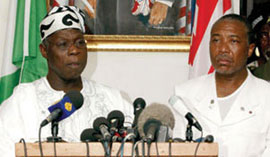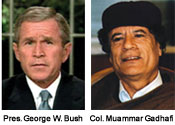Activists closely watch Bush in Africa
- Click here to read recent and past articles on the African Union
- Why Liberia? Why Pres. Charles Taylor? (Column by A. Akbar Muhammad)
- In The Twilight Of Our Freedoms? (by Cynthia McKinney)

THE WHITE HOUSE(FinalCall.com)–President George W. Bush left for his first visit to Africa July 7, confident that his administration will bring about a peaceful “regime change” in troubled Liberia.
Just before his departure on a whirlwind, five-nation, five-day tour of the continent, Mr. Bush dispatched a scout-team from Rota, Spain, made up of 15 military experts and their security escorts to help determine if the U.S. should send troops to participate in an international force, hoping to enforce a ceasefire in the bloody, three-year-old rebellion against that country, founded in the 19th century by former American slaves.
While he’s not certain about deploying U.S. troops, Mr. Bush said he is certain about the fate of Liberian President Charles Taylor, who won a landslide election in 1997, following another bloody civil war that raged from 1989-1996.
“I have made up my mind there needs to be stability in Liberia, and one of the conditions for a peaceful and stable Liberia is for Mr. Charles Taylor to leave the country,” the U.S. leader told a Voice of America interviewer July 5.
“And so we’re working the issue now. And I say ‘we,’ it’s the Secretary of State, the very capable Colin Powell is working with Kofi Annan, who is also working with others on the continent to facilitate that type of move,” Mr. Bush continued.
Just hours later, Nigeria’s President Olusegun Obasanjo flew into Liberia to discuss a smooth exit for Mr. Taylor and an offer of temporary asylum in Nigeria. Mr. Taylor was indicted on war crimes charges June 4 by a United Nations-backed special court in neighboring Sierra Leone.
Following a 90-minute meeting at Monrovia’s International Airport July 6, the two presidents announced that Mr. Taylor’s exit to Nigeria has been negotiated until he can find permanent residence in a third country. Nigeria does not have a law permitting the extradition of Mr. Taylor, according to UN officials.
“We are here as brothers, as neighbors, and those who feel that what is happening in Liberia could happen anywhere in Africa, and Liberia needs a lifeline to solve its problems,” said Mr. Obasanjo, during a press conference broadcast live on CNN. The transition to a new government “must be orderly and peaceful” in order to resolve the conflict, he said.
“We believe that the participation of the United States right now is crucial. We embrace it,” said Mr. Taylor, during the press conference. Earlier he told religious leaders that U.S. peacekeepers should be present in his country before he would depart.
“This has to be an orderly transition–not a surrender by a legitimate government to some rebel organization,” Cabinet Minister Samuel P. Jackson, a close adviser to Mr. Taylor, told CNN.
“We prefer that there is a constitutional arrangement,” said Vaani Passawe, a Taylor spokesperson, according to a published report. “That can’t take place in an atmosphere of immediacy.”
Mr. Taylor’s successor would be Vice President Moses Blah.
The Economic Community of West African States (ECOWAS), anchored by regional economic and military powerhouse Nigeria, has pledged 3,000 troops for an intervention force in Liberia. ECOWAS leaders, along with Britain and France, have asked the U.S. government to take a leadership role during at least the first phase of an operation designed to separate and disarm the warring factions, and to make it possible for an interim administration to take control of the country. The 15-nation body has also asked South Africa and Morocco to send troops.
“ECOWAS and the African Union (AU) should intensify their initiatives to get an advanced country, possibly the United States, to spearhead peace efforts in Liberia, just as Britain and France did for Sierra Leone and Cote d’Ivoire,” said Ghana’s Lieutenant-General Seth Obeng, chairman of the ECOWAS Defense and Security Commission, in a published report. The ability of West African countries to send enough troops is plagued by financial and logistical constraints, he said.
The intervention force would separate the combatants and enforce a shaky ceasefire agreed to June 17 between the Liberian government and two rebel movements–Liberians United for Reconciliation and Democracy (LURD), which enjoys support from neighboring Guinea, and the Movement of Democracy for Liberia (MODEL), based in Sierra Leone. Rebel forces control about two-thirds of the country.
Leaders from 16 Liberian political parties and from religious and women’s organizations have been meeting in Ghana to draw up a peace plan and to agree on the membership of a transition government, which is expected to run the country for 18 to 24 months before elections could be held.

Liberian government officials at the country’s embassy in Washington were unavailable for comment, nor did they return several telephone voicemail messages left by The Final Call. One caller to a radio talk program, however, who identified himself as a Liberian citizen, suggested that it would be a mistake to trust U.S. forces to make peace, because U.S. financial support for the rebels had been funneled through Guinea. The reason, the caller said, was U.S. disapproval of Mr. Taylor’s friendly relations with Libyan leader Muammar Gadhafi.
“There are speculations all over the place, within the country, here in Washington, and everywhere in-between, about U.S. involvement behind the scenes, behind those two rebel movements. I personally think those speculations are not unfounded,” Emira Woods, co-director of Foreign Policy in Focus, confirmed, in response to a question from The Final Call during a briefing concerning the Bush Africa trip at the Carnegie Endowment for World Peace July 2.
“I cannot underscore further the importance of moving away from a military response to Charles Taylor and moving towards a more sustainable response that looks at the core problems in the entire sub-region,” said Ms. Woods, described by other panelists as the most expert among them concerning Guinea’s role in the Liberian conflict.
“I don’t believe it was a direct covert program to support the LURD or the rebels in Liberia,” Salih Booker, executive director of Africa Action, said in an interview following the briefing. “But I am sure that if the Guinea government was providing that kind of assistance, the U.S. was aware of it and was turning a blind eye.
“The United States is concerned about Taylor in part because of his past connections with Gadhafi and Libya,” Mr. Booker continued. “But in this case, I don’t feel that the U.S. is literally for the rebels,” he cautioned, pointing out that there is a larger regional reality, and that the rebel movements, as well as the government itself, “all represent danger to the stability of the country.”
Another Africa expert at the July 2 briefing expressed doubt that the U.S. has been sending aid directly to Guinea or to any other country “to get rid of Charles Taylor.” But, the U.S. “clearly has (Col. Muammar) Gadhafi in their sights,” Bill Fletcher, president of TransAfrica, told The Final Call. “I think they find Gadhafi very threatening. And this is not just this administration.
“When you consider that a few years ago, when Gadhafi made a very symbolic statement about turning away from Arabs and turning to Africa, I think at that point it started to frighten the United States.”
Mr. Gadhafi was the most warmly received foreign dignitary at the inauguration of South African President Thabo Mbeki, because “the South African people look at the support that they got from Libya as essential in their fight,” said Mr. Fletcher.
“The Bush administration, I think, is very fearful of Gadhafi and his role. I think that their objective is certainly to narrow and limit the influence of Gadhafi to try to move him out of being a major player in the African Union, and have him be replaced by forces that are more sympathetic to the Bush administration.
“I think it is important for us in the United States to not let that happen. It does not mean that you have to support each and every thing that Gadhafi does. But I think that we should not allow Libya to be isolated. What I smell is another case of regime change, coming right around the corner.”
“That’s (my) concern when it comes to Libya. I just want to be clear. It’s not about whether one supports how Gadhafi runs Libya, but I think what we do need to appreciate is that he and Libya played a major role in moving the African Union, and there is an orchestrated effort to rewrite history and ignore that contribution,” Mr. Fletcher concluded.












